Transcription
PRISON STATISTICS AND
THE EFFECTS OF INCARCERATION ON CHILDREN
(National Resource CTR. on Children... NFCCfi)
Gary Field
DC M05398
Century C.I.
Century, FL.
32535
[black and white pen drawing of a figure behind bars, with a long shadow stretching out beneath]
1 of 16
Who is in prison?
. In 2007, 2.3 million people were held in Federal or State Prisons; 200,000 women and more than 2.2 million men
. African Americans constitute 900,000 of the total prison population (07 figures)
. From 1995 to 2005, the number of women in prison nationwide increased by 57%
. There are now more than 7 million Americans incarcerated on on probation or parole - an increase of 280% since 1980.
. Roughly two-thirds of women in prison are women of color, representing the fastest growing prison population.
. 93% of people in prison are male, 7% female
. 25% of people in prison in state and local jails have mental illness.
. In 2002, 76% of people in state prisons were convicted of non-violent crimes, including 31% for drug offenses, and 29$ for property offenses
. Blacks make up 12.3% of U.S. population and 43.9% of the state and federal prison pop. Latinos constitute 12.6% of the country's population, but make up 18.3% of the prison pop. Whites are 69% of the general
(2-16)
population with 34.7% of those incarcerated
. One in every black males born today can expect to go to prison in his lifetime.
THE EFFECTS ON CHILDREN:
What do we know about children with parents in prison?
. In 2007 more than 1.7 million children had a parent in prison or jail.
. Nearly 10 million children have a parent who _is_ or _has_ been under some form of criminal justice supervision.
. In 2007, one in 43 (2.3%) American children had a parent incarcerated in a state or federal prison.
. One in 15 black children and one in 42 Latino children had a parent in prison compared to one in 111 white children.
. Approximately half of children with incarcerated parents are under 10 years old.
. 2% of incarcerated fathers and 8-10% of mothers have children in foster care.
. Information from one study of children in foster care with parents in prison provides the following data:
- 25% of children live with their fathers when a mother does to prison
- 90% of children remain with their mothers when the father is incarcerated.
- 50% of children with an incarcerated mother live with their grandmothers.
(3-16)
- In the child welfare system, 1 in 10 children in in-home settings is living with someone who is on probation.
- 1 in 5 children with incarcerated parents had clinically significant internalizing problems (e.g., anxiousness, depression, withdrawal)
- 1 in 3 had attention problems, aggression and/or other disruptive behaviors
. About 14-30% of children entering the child welfare system have incarcerated parents
. About 1 in every 5 African-American children who come to the attention of child welfare agencies have a recently arrested parent compared to only 1 in 10 white children and only 1 in 20 Hispanic children.
THE IMPACT
. Children of incarcerated mourn the loss of their parent.
. Witnessing the arrest of a parent intensifies the child's loss, sense of helplessness and creates additional trauma.
. Many children of incarcerated parents exhibit symptoms of Post Traumatic Stress Disorder.
. Social stigma causes families to avoid discussing the absence of a
(4-16)
parent. Being kept in the dark can influence children emotionally and psychologically - and impact the restoration of parent/child relations when the parent in prison is released.
- Literature suggests that parental incarceration can have profound consequences for children including: feelings of shame, grief, guilt, abandonment, and anger; social stigma; disconnection from parent; poor school performance; impaired ability to cope with future stress and trauma; potential addiction; and negative perceptions of police and other authority figures.
. Children with parents in prison need support and there are very few programs and social services specially designed to serve their complicated and layered needs.
WHY DO WE NOT KNOW MORE?
. Studies on children of people in prison have focused primarily on those who intersect with child protective services and constitute only a fraction of all children with incarcerated parents.
. Data on children living with other parents, relatives, and casual caregivers are inconsistent and inconclusive.
(5-16)
. Similarly there are no inter-agency efforts to assess the impact that law enforcement and criminal justice's policies have on children and families of people in prison.
. At the time of arrest, conviction and imprisonment, parents are often fearful of giving information about their children and families. Therefore, information that is gathered is usually extremely inaccurate.
PARENTS IN PRISON
. In 2007 there were 809,000 parents, and increase of 79% from 1991.
. 85% of women in 65% of men in prison are parents.
. Incarcerated parents lose their parental rights at a disproportionate rate
. 72% of incarcerated mothers with children under age 18 live with those children before entering prison.
. 54% of mothers and 57% of fathers in state prisons reported never receiving a visit from their children.
CAREGIVERS
. Caregivers of children with parents in prison bear numerous burdens, including stigma and shame association with having a family member in prison, increased financial strain, physical and emotional stress, and lack of external resources.
(6-16)
. Public assistance programs including Temporary Assistance for Needs Families (TANF) were not designed with "Relative" caregivers in mind. Grandparents, especially, are reluctant to seek support for fear of losing the children to the child welfare system.
. Caregivers struggle with multiple challenges in fostering continued relationships between children and their parents in prison.
. Most prisons are not accessible by ANY form of public transportation, restricting child-parent visits. In some cases this means children will never visit their parents.
. collect phone calls from prisoners may be an economic burden caregivers cannot manage.
. Caregivers of children with incarcerated parents are often forced to renegotiate family responsibilities and assume new roles.
. Approximately 70% of children whose mothers are in prison live with grandparents and other relatives.
. 62% of parents in state prisons and 84% of parents in federal prisons are held over 100 miles away from their residence. 43% of parents in federal prisons are held over 500 miles away from their last residence.
- End of NRCCFI Report
Other posts by this author
|
2021 jul 3

|
2021 mar 7

|
2021 mar 3
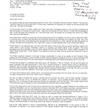
|
2021 jan 31

|
2020 nov 19

|
2020 oct 29

|
More... |

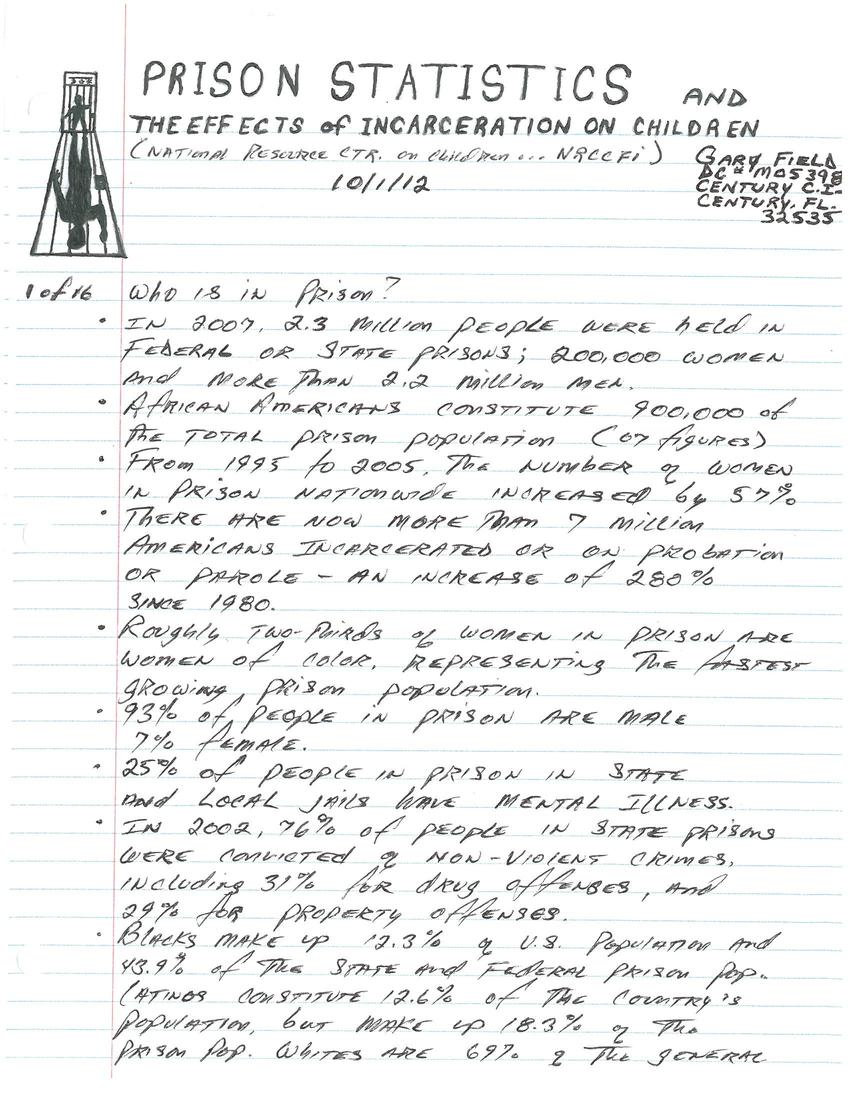
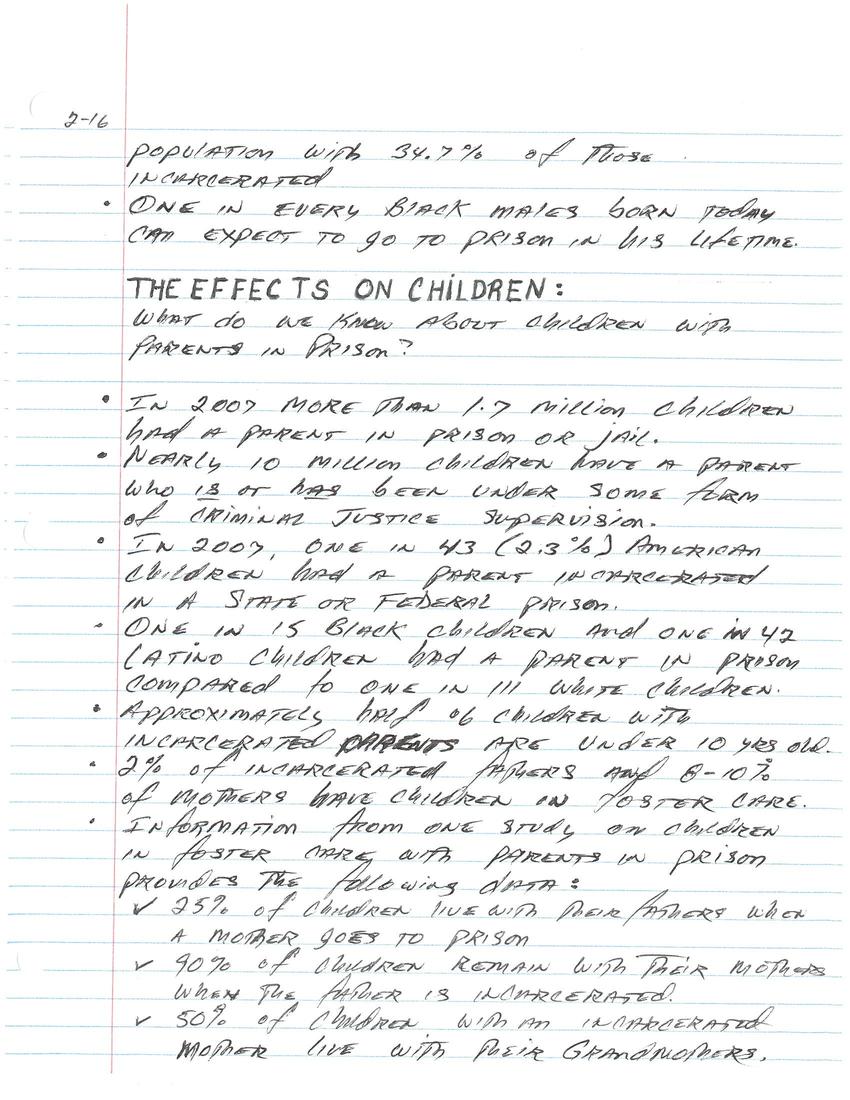
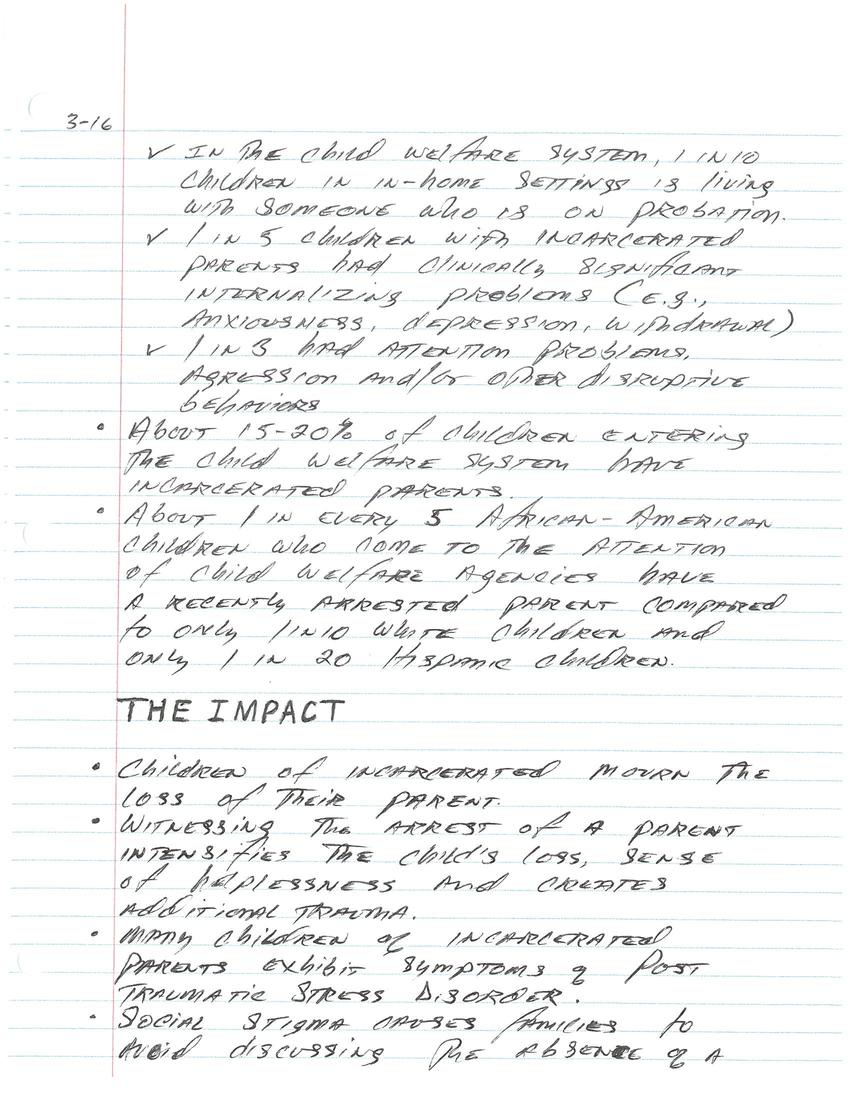
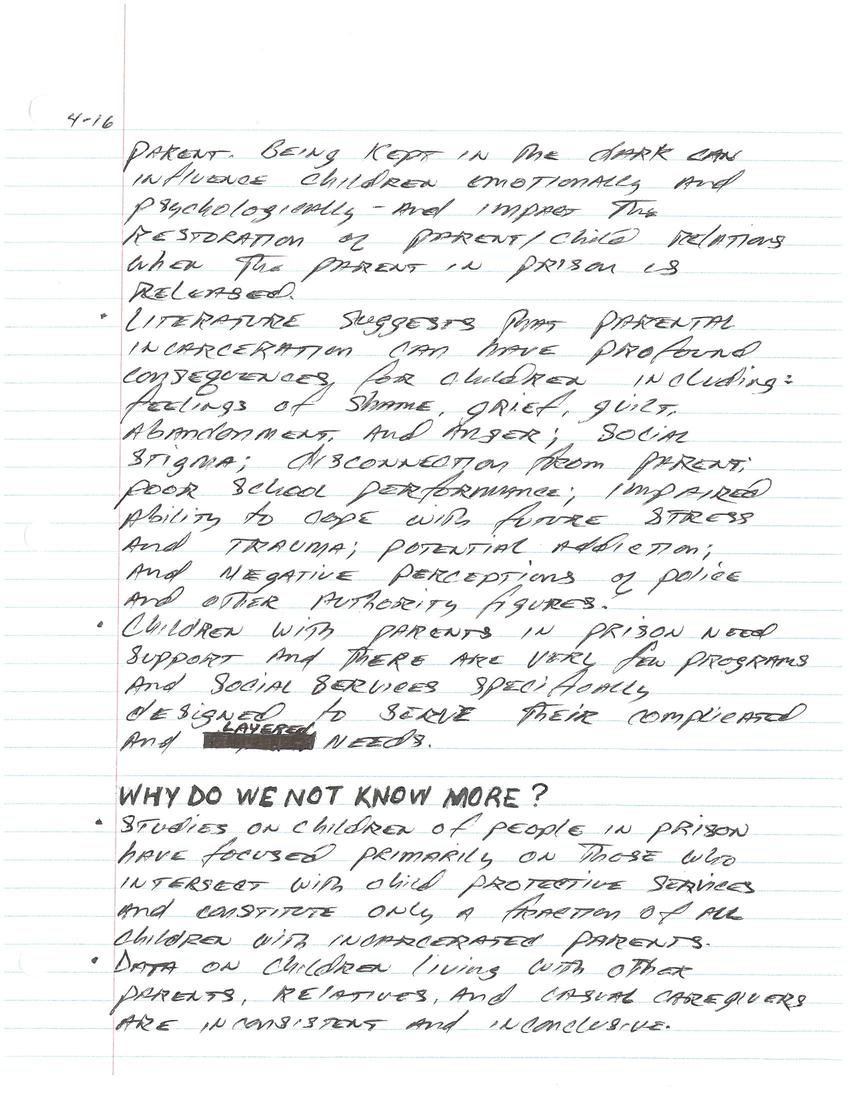
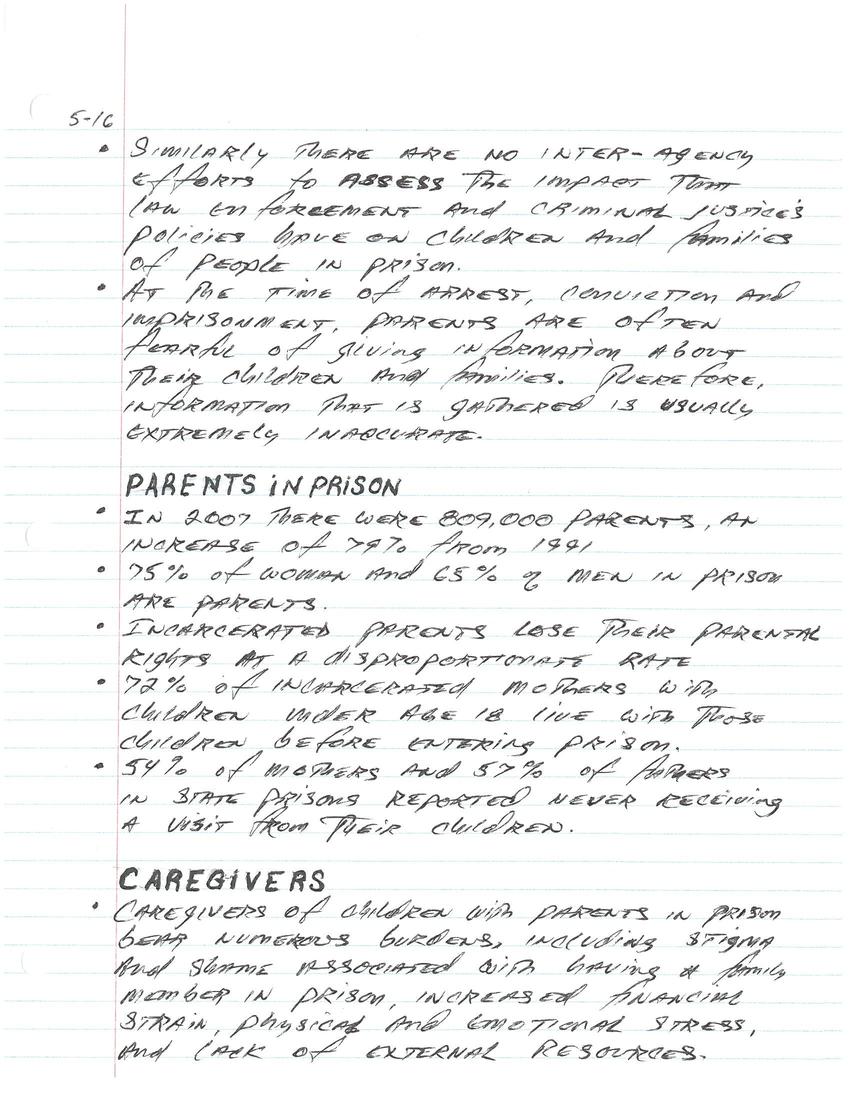
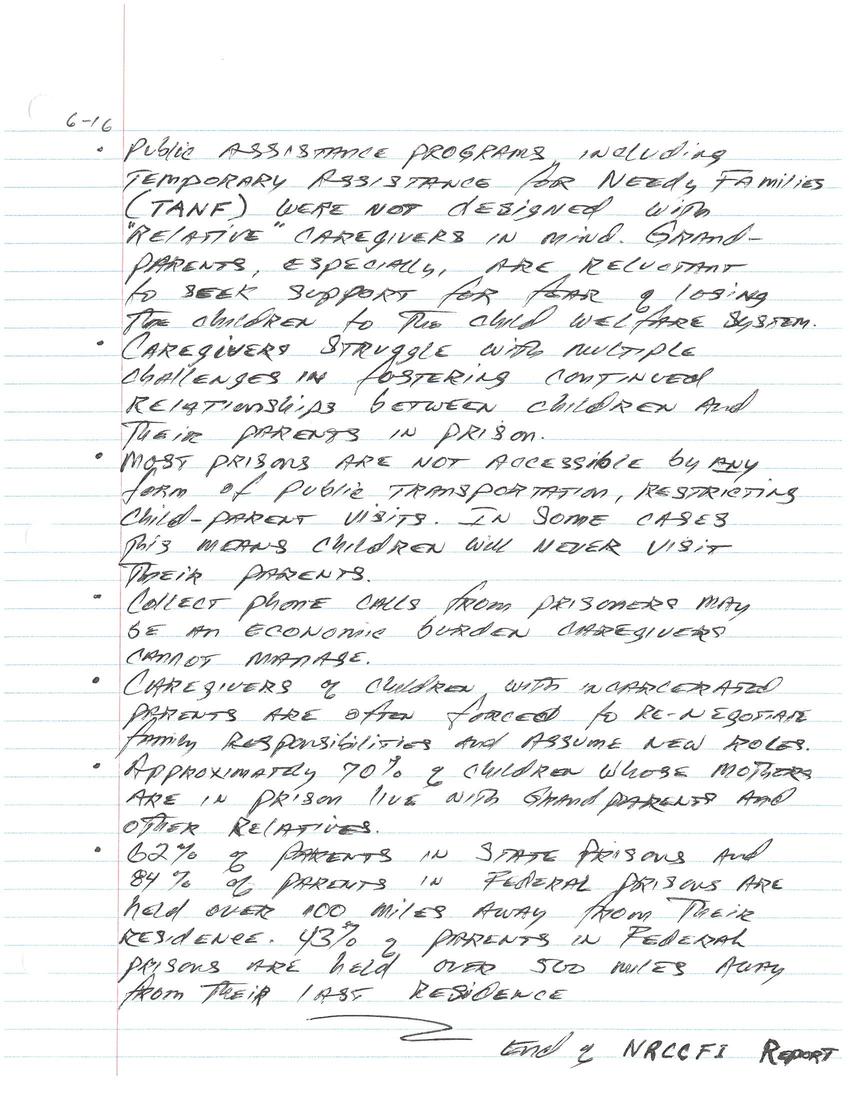

Replies (2)